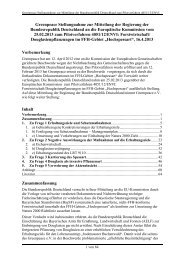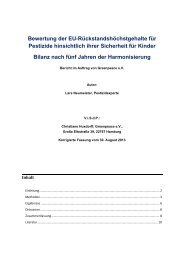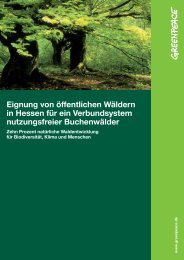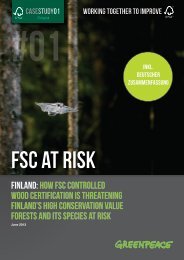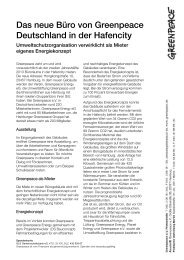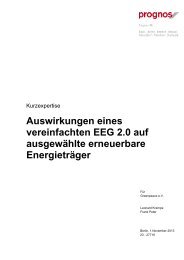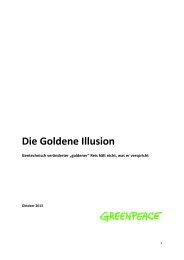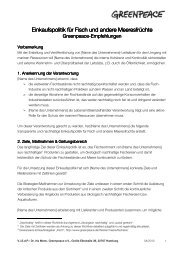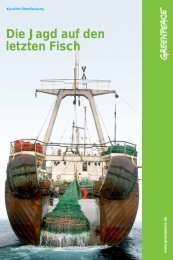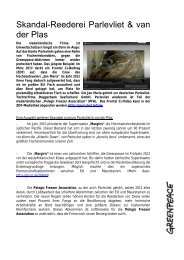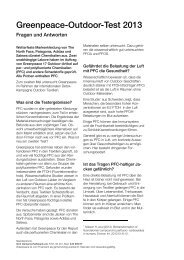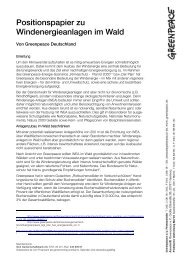Untitled - Greenpeace
Untitled - Greenpeace
Untitled - Greenpeace
You also want an ePaper? Increase the reach of your titles
YUMPU automatically turns print PDFs into web optimized ePapers that Google loves.
CARVING UP THE CONGO<br />
51<br />
the overlap of interests ‘between the head of<br />
the provincial administration and the<br />
company’. 290<br />
ARELO cites a number of shortcomings in<br />
Trans-M’s handling of the social responsibility<br />
contract process: 291<br />
s the lack of proper consultation of the people<br />
of Lomako<br />
s the poor content of the social responsibility<br />
contract listing the obligations of the logging<br />
company<br />
s a questionable commitment to genuine<br />
development as a result of the contract<br />
having been negotiated by Trans-M in the<br />
absence of any clear, informed<br />
representation of community interests<br />
s the fact that several village representatives<br />
refused to be part of this swindle (‘tricherie’)<br />
– which included ‘forgery and other defects<br />
… evident in some of the signatures attached<br />
to the document at the 8 February 2005<br />
meeting, at which people were forced<br />
to sign’ 292<br />
The memorandum concludes by protesting<br />
against the arrogant and disrespectful way the<br />
negotiating process was conducted, against<br />
the interests of the Lomako communities. 293<br />
ARELO calls for the ‘immediate and<br />
unconditional suspension of Trans-M’s/Congo<br />
Futur’s activities in this future protected area<br />
because they do not meet the needs of the<br />
local community’. 294<br />
The social conflicts arising from Trans-M’s<br />
poor contribution to local development in the<br />
Lomako area continue, two years on.<br />
Trans-M workers complain of appalling<br />
working conditions. Many workers have voiced<br />
concern that they have no proper contract;<br />
workers camps are unsanitary; the work can<br />
be quite unsafe, and there have been a number<br />
of fatal accidents for which relatives have not<br />
received proper compensation. Those who<br />
have challenged Trans-M about the situation<br />
(village chiefs, local authorities, the local<br />
forestry department) have complained about<br />
intimidation. 295<br />
©<strong>Greenpeace</strong>/Reynaers<br />
‘Trans-M was imposed on<br />
the community … The head<br />
of the Department for the<br />
Environment simply informed<br />
the community that they<br />
were going to log the<br />
forest.’ 296<br />
Alibuku community leader<br />
Trans-M is destroying community<br />
forest resources in Kisangani<br />
<strong>Greenpeace</strong> has obtained a copy of another<br />
social responsibility contract 297 which Trans-<br />
M negotiated in February 2005. This one is<br />
with the community of Alibuku village, near<br />
Kisangani in Orientale Province, impacted by<br />
the GA 033/05 logging title. 298 The<br />
agreement includes commitments to build a<br />
school and a clinic, to provide transport for<br />
villagers to Kisangani if there is room in the<br />
logging trucks, and to provide free wood to<br />
use for coffins.<br />
But implementation of these promises has<br />
been disappointing. Apart from the<br />
construction of a school, few of the promises<br />
made to the community have materialised.<br />
The company is the cause of considerable<br />
tension in the area and risks damaging local<br />
livelihoods. 299 More than a year after the<br />
contract was obtained by <strong>Greenpeace</strong>, a field<br />
mission from the NGOs Bank Information<br />
Center and Environmental Defense visited the<br />
village and drew the following conclusions:



